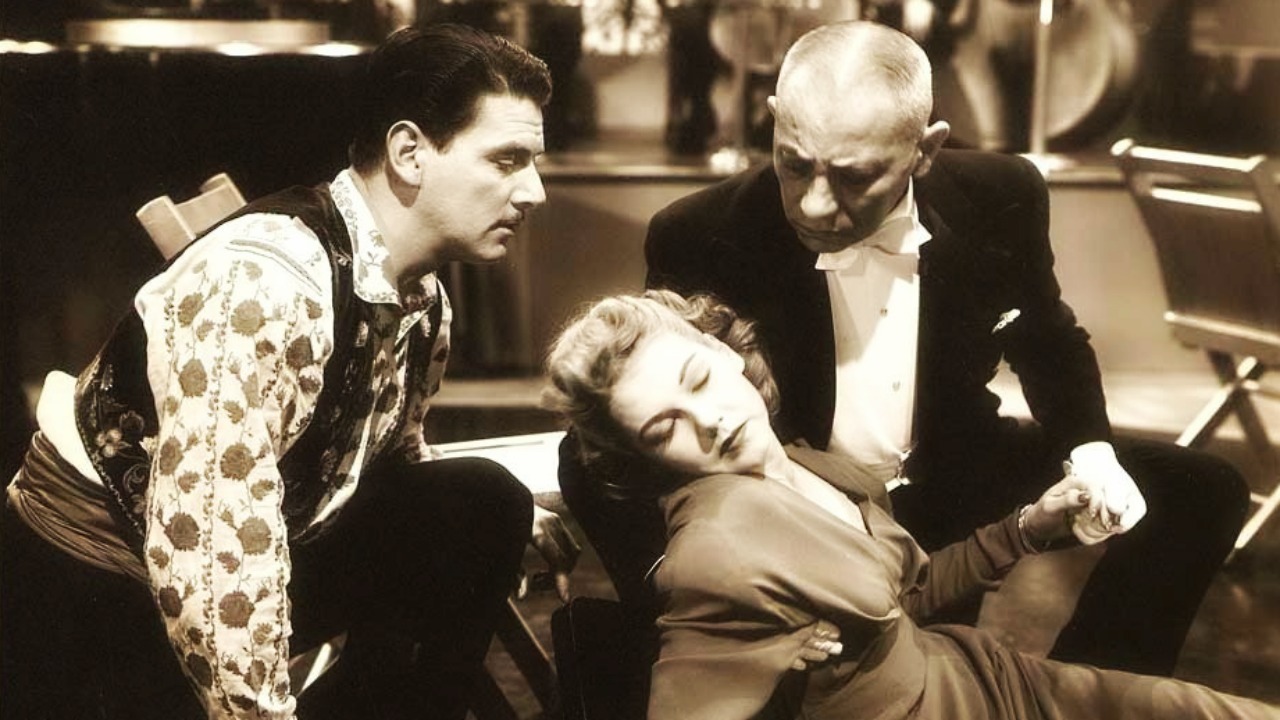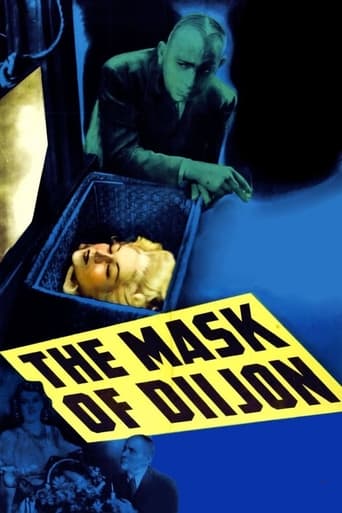GamerTab
That was an excellent one.
Boobirt
Stylish but barely mediocre overall
Smartorhypo
Highly Overrated But Still Good
Jenni Devyn
Worth seeing just to witness how winsome it is.
mark.waltz
In 1945, Producer's Releasing Corporation took the rising film noir genre by surprise with low budget film noir classic "Detour". A nearly similar classic, "Decoy", followed the next year. Unfortunately, even with the casting of the legendary Erich von Stroheim here, "Dijon" barely makes the mustard, closer to French's than Grey Poupon. It's your standard "Svengali" like melodrama with hypnotist von Stroheim obsessed with assistant Jeanne Bates so much that through a trance like manipulation, he gets Bates to marry him. She's really in love with pianist William Wright, but von Stroheim is obsessed so much that he continues to stalk Bates even though it's a lost cause. A complete meglomaniac, von Stroheim harasses Bates to the point of murderous intent, leading to a scheme to where he hypnotizes Bates into killing her true love.This, for the most part, is pretty standard melodrama with only von Stroheim's commanding presence to keep it from sinking into poverty row muck. PRC does a great job with lavish sets and a few surprises, but nothing like that final which comes after a rather standard chase sequence and shoot out. Psychologically, this is fascinating as a study of the mental illness surrounding complete self absorbtion, and is another reminder of Shakespeare's immortal words that whom God intends to destroy, he drives mad first. I much prefer von Stroheim's similar tale of conceit, "The Monster and the Lady", made at Republic just two years before. But what fails in this film won't make you forget this film, leaving you with a dropped jaw followed by uncontrollable laughter and possibly even applause.
MARIO GAUCI
Erich von Stroheim's acting career often saw him playing some kind of variety-act performer: in THE GREAT GABBO (1929), which I own but have yet to watch, he was a ventriloquist; in THE GREAT FLAMARION (1945), an expert marksman; and here, as in the French-made L'ALIBI (1937; which I have now acquired), he dabbles in mind-reading (though, in this case, he starts out as a magician who 'trips up' in front of an unforgiving audience and is humiliated – to the consternation of his heavy-set promoter, who has no qualms about receiving guests at home while slumped on a bed in his tank top undershirt!). Incidentally, most sources give the film's title as THE MASK OF DIJON, so that I was surprised to notice the extra "i" in the credits! While the script makes no particular exertion on the star's immense talent, his commanding presence and accented delivery of lines is more than enough for him to create a memorable character nonetheless (making good the publicists' dubbing of the former auteur as "The Man You Love To Hate"!); interestingly, just as he had been flanked by Dwight Frye in THE CRIME OF DR. CRESPI (1935), this time around Edward van Sloan is on hand to evoke that distinct Universal Horror flavor (the director having previously helmed THE RAVEN [1935] for that studio, despite the film under review itself bearing the low-rent PRC logo)! The one other strong point here, in fact, is the atmosphere (aided by alternately odd and menacing camera angles, expressive night-time lighting and even fast cuts during an especially tense and paranoid moment for Stroheim's character). While the remaining supporting cast is weak – fatally, the young leads whose innocuous romance sends the unbalanced yet egomaniacal protagonist off the deep end – it does include Denise Vernac, the star's current real-life partner, as another down-on-her-luck entertainer. Throughout, Stroheim hypnotizes a number of people – among them driving Vernac's associate/husband to suicide and a stick-up man at a diner who immediately returns the dough to the befuddled proprietor – but his efforts to dispose of his amorous rival (again, and much like in the afore-mentioned CRESPI!) ends in disaster, and death for himself…here meted out in unforgettable, and most ironic (given the film's opening sequence), fashion: let me just say it involves a guillotine and a playful kitty and leave it at that!
bkoganbing
It is rather well known that you cannot force anyone to do anything under hypnosis that they will not be willing to do themselves when of their own free will. Unfortunately that bit of reality which audiences in 1946 knew well that keeps The Mask Of Dijon from becoming a top flight melodrama. The cheapness of a PRC production also doesn't help.They combine to defeat the incomparable Erich Von Stroheim who is playing a formerly great magician with an insane jealous streak that makes Othello look well adjusted. His Desdemona is Jeanne Bates a nightclub singer who runs into her old accompaniest William Wright who persuades her to come back and take Von Stroheim's rusty magic act as a package deal.What both don't know is that Von Stroheim has been studying the art of Mesmer and he's going to use that to settle old scores, real and imagined. I can't say much more, but I will agree with another reviewer who did love the ending that Von Stroheim met.Would that the rest of the film was that good.
JohnHowardReid
Disappointing. The screenplay always seems on the verge of presenting some interesting plot twists and spell-binding effects, but they never happen. The attractively noirish black-as-a-nightmare lighting photography also constantly signals that some intensely gripping story development is about to occur, but once again all we get are the usual predictable situations which lead to a dull if action-full climax.Steadfastly routine and even turgid direction from Lew Landers doesn't help matters. On occasion, Mr Landers can direct a movie with both punch and style; but in this instance, he exhibits neither quality. And as might be expected, aside from the charismatic von Stroheim, the players are not much to write home about either. Both hero and heroine wear out their welcome, and even von Stroheim's performance suffers from the film editor's tendency to hold shots far too long. Trimming the close-ups would have improved the movie a lot. As is, it's far too slow.Production values are also somewhat limited. True, the camera-work rates as a definite notch above the usual flat Producers Releasing level, and the sets are fulsomely dressed. But we tire of them. The one small set in front of Sheffield's shop is used over and over, and the fact that it becomes so familiar negates whatever small impact the brief spurt of climactic action might otherwise have enjoyed.

